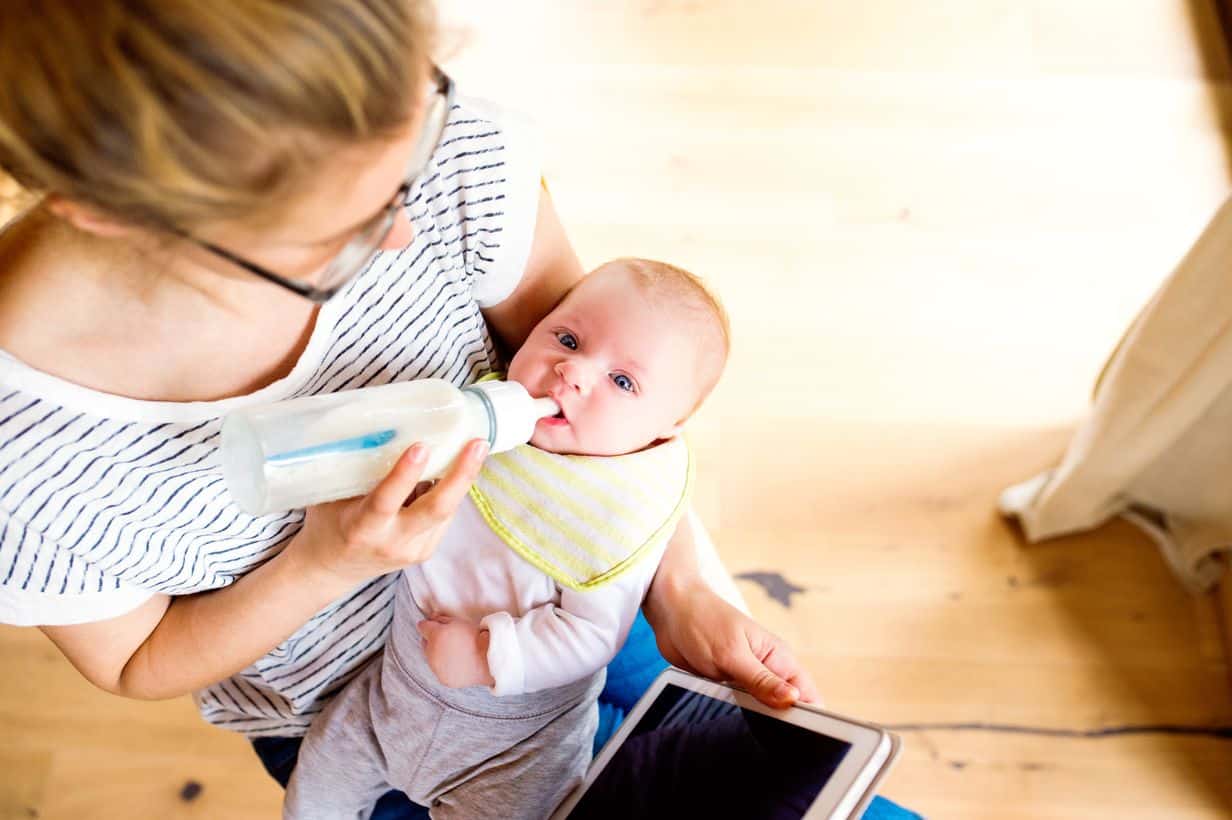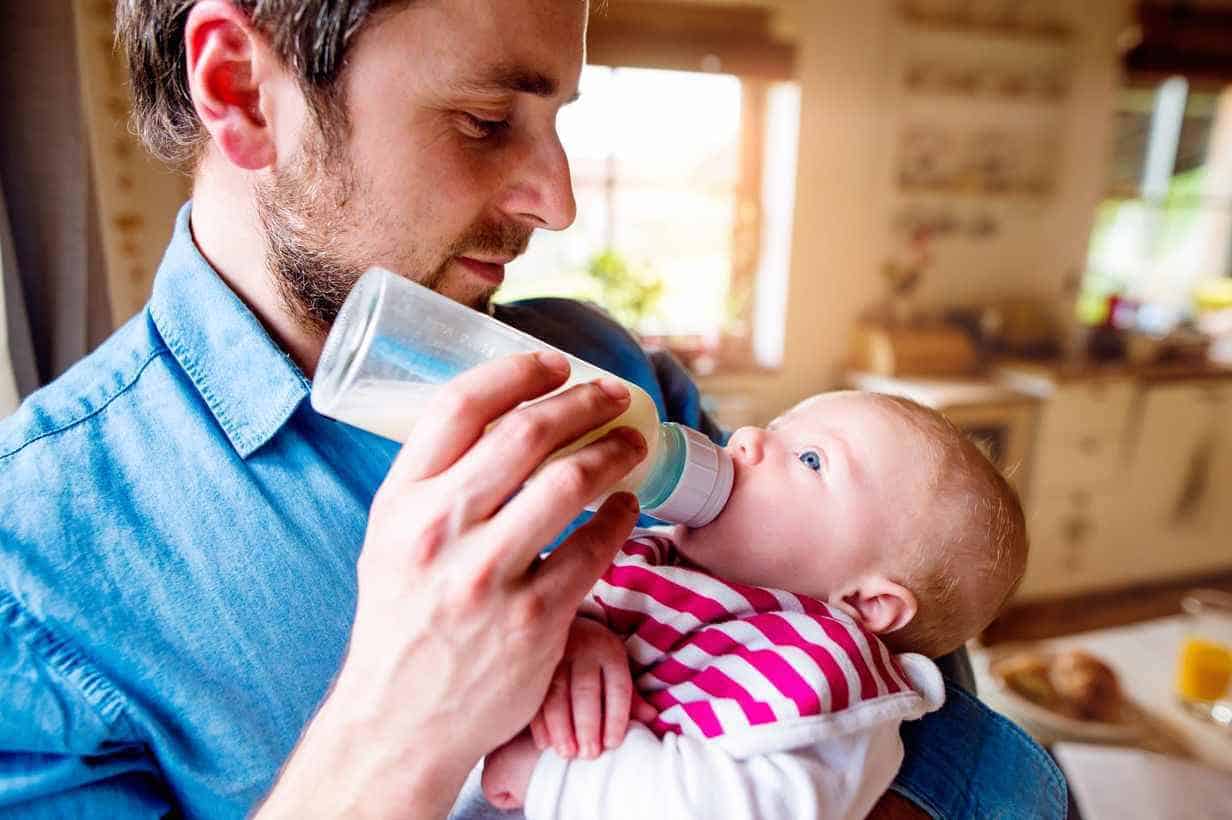Proper care for our little ones is one of the very most important things in life. We only have one chance to do things right, so we had better be as well informed as we possibly can and try to do our best. For the sake of our children’s well-being, now, and in the future as well. Early childhood often has been implicated as a main factor in the direction our life takes in the long run.
Bottle feeding can be a tricky thing. It can also be particularly confusing, even downright scary, for new parents wit no previous experience. The question, can babies drink cold milk, is one that has been asked a countless amount of times by an equally unlimited number of people since the invention of baby bottles as well as refrigerators.
Can Babies Drink Cold Milk
The truth is that babies can and do drink cold milk without real any real potential harm. Everyday, someone, somewhere, is in a hurry and doesn’t take the time to remove the container of chilled milk from the fridge in time to let it naturally achieve room temperature, or place it in a pan of hot water, or even simply microwave it for a few seconds before giving it to their baby. This means they end up feeding their infant child cold milk. And believe it or not, it’s far from the end of the world.
Some babies seem to prefer the cold milk. Other babies are actually disturbed by the chilled temp of the cold liquid. Truth be told, there is no simple universal answer for this question.
Some parents swear by warm milk, believing that it is somehow safer for their baby. And it is possible that it is, perhaps it isn’t either. Either way, warm milk definitely is more prone to fool your baby into believing that he or she is drinking genuine breast milk fresh and warm straight from their mother’s nipple.
More: Nutramigen vs Alimentum
Other parents feed their babies with warmed milk due to the relaxing effect it has on their child. The former is especially useful at night, directly before laying your baby down to sleep for the night. It is also rather helpful for putting baby back to sleep when they wake up upset in the middle of the night.
The Ideal temperature for milk and food for babies is 98.5 degrees Fahrenheit, or 37 degrees Celsius. In order for a reliable temperature reading it is suggested to check your baby’s milk with a reputable food thermometer. In all honesty, however, milk does not necessarily have to be warmed in order for you to be able to safely give it to your baby for consumption. Warm milk in reality is simply comforting for your baby, naturally reminding them of their mother real breast milk which is obviously warm.
Studies at North Dakota University have proven that cold milk is as healthy and safe for babies as milk of higher temperatures. Regardless of the facts, babies, especially newborn infants, have shown preference to warm milk vs cold milk and have displayed less signs of discomfort, stomach aches, or hiccups.
The experts who performed these studies have also suggested that for your babies comfort, it is almost always better to take the time to warm your babies milk before feeding them whenever possible.
Experts at Ohio University Medical Center suggest heating fresh formula as soon as it has been mixed with cold water. Inside your baby’s bottle, place the formula either under a stream of warm water from your sink’s faucet, or place it inside of a pan of hot water on the stove and gradually raise it’s temperature. Never bring the formula to the point of boiling as this is a serious danger and risk to your child’s health, both internally and externally.
Never store formula for more than a few hours. harmful bacteria to your baby can quickly develop and grow especially if the formula is not sealed properly. 24 hours is the absolute maximum amount of time that you should ever attempt to store formula for even in the most properly sealed container. Never mix formula with warm water, always use cold, and never mix with cow’s milk either. This will throw off the balance of the formula and cause discomfort, upset stomach, gas, and a host of other possible conditions within your baby.
Cold Breast Milk & Upset Stomach
Technically there is no real reason why a baby should not drink cold breast milk. Some babies even truly prefer the cold milk to drink and seem to be more than happy to receive it. Other babies are not nearly so welcoming of the chilling sensations accompanied by the cold drink.
In the end, it seems to be a case by case type decision that needs to be made by each baby and it’s parents. As are most things concerning raising over children. Each child is unique, as are it’s parents, not every fact is universal, and not everything accepted by one baby will be accepted by yours.
While milk and it’s temperature could possibly cause your baby to develop an upset stomach, it’s highly unlikely to cause any serious conditions or issues. Upset stomachs in babies are far more typically caused by the baby sucking more air than necessary into it’s stomach. If your child seems to develop an upset stomach frequently during or after feeding him or her milk, whether warm milk or cold, try replacing worn out bottle tops and nipples. Also check bottle nipples for pinholes and bottle tops for a solid seal.
Overall the best type of milk for babies which tend develop upset stomachs is breast milk. There are more nutrients, protein, and vitamins there naturally and your child is likely to ingest copious amounts of air as well.
F.A.Q. Cold VS Warm Milk For Babies
The first year of a baby’s life is perhaps the most important and rich in events. During this time, the baby not only grows but also masters basic skills like moving, communicating, playing and becoming more and more independent. Properly balanced nutrition at this time is of the same exceptional importance as parental love and care. Here are some questions and answers disturbing thoughtful parents in this period of their baby’s life.
Can babies be given cold breast milk?
A lot of mommies who cannot be around children all the time pump milk and store it in a fridge till the baby needs it. But there is a question arising – what temperature should be breast milk to give it to a baby? Intuition often gives the right answer – and parents just do what they think is best for their children, what their baby likes or prefers.
Some say it is not necessary to warm breast milk up, and it is enough just to take it from the fridge, while others insist on taking it out an hour or two before it is needed to make it a bit warmer in the room temperature.
More: How Long Can Breast Milk Sit Out Before It Goes Bad
This is probably the most common case. Still some babies prefer only warmed milk and will reject drinking cold bottles. Parents usually know preferences of their little ones, so the main recommendation is – just do what your baby likes and what is easier for you. If your dear daughter or son doesn’t refuse cold breast milk from the fridge – you most probably will never have any problems with getting a sore throat. This is a good way to harden the body. And if the child prefers warm breast milk, just warm it whatever it takes, because babies can start taking in smaller amounts if they dislike something.
Which is better – cold formula for babies or warm formula for babies?
If the question is about the temperature, then the answer can be just the same as concerning cold and warm breast milk – just feed your child according to his or her preferences. But if the matter is not exactly the temperature of the given bottle, but the temperature of water used to prepare formula, then it needs separate attention. The matter is that the UK formula manufacturers usually recommend dissolving formula in hot boiled water and then cooling it down to the necessary temperature.
This sounds too complicated for many parents, especially when a baby demands a bottle in the middle of the night. Going to the kitchen with your eyes closed to perform this task seems to be nerves-killing. So most parents prefer the US types of formulas, which are recommended to dissolve in cold water from the tap.

What is the difference between breast milk and cow milk?
Nature created the best first food for a newborn baby which is breast milk. It has everything that the growing body requires at the initial stage of its development: vital nutrients, building material, energy, and protection. But there are situations when breastfeeding is limited or becomes impossible. Some parents think then about cow milk as an option. Choosing it, we need to know how much it differs from what natural breastfeeding offers.
The protein content in breast milk is two or three times smaller than that of cow milk, but it is much better absorbed and does not cause any allergies.
The content of fat in both kinds of milk is the same, but its quality differs. Breast milk fat is absorbed better and easier, ensuring the proper functioning of the nervous system and gastrointestinal tract, besides, it positively affects the functioning of the intestines.
The amount of carbohydrates in breast milk is much larger than in cow’s milk. It is a source of energy, due to which the child is active, cheerful and happy.
Breast milk has naturally balanced mineral composition – mineral elements and vitamins in the exact amount that the baby needs at this or that stage of life.
At what age can we give children cow milk?
Opinions on this issue diverge. Some specialists believe that children up to 3 years old should be given formulas only, but for many families, it is not an option because of the high cost. Most pediatric specialists agree that a baby can be given diluted cow milk beginning with the age of 8-9 months old, but better after 12 months.
The quality of such milk is of great importance. If it is not the cow milk you get directly from the neighboring farm, it should be carefully chosen and only come from well-known and certified manufacturers. It is highly advisable to buy specialized milk for babies. It is produced in ecologically safe areas and provided with strict control over compliance with sanitary standards at all stages of manufacturing and storing.
Can there be any danger when giving a baby cow milk?
Cow milk has almost 3 times more protein than breast milk. Small babies cannot cope with such quantity of protein without any consequences. But the worst thing is an excessive amount of minerals in cow milk! There is 5 times more calcium than a human baby needs and 7 times more phosphorus.
While calcium is eliminated out of the body without problems, bringing out the excessive amount of phosphorus requires additional forces. Baby’s kidneys have to use both calcium and vitamin D for this purpose. Thus, the more cow milk a baby consumes, the greater the chance of vitamin D and calcium deficiency becomes.
As is known, the deficiency of vitamin D and calcium inevitably leads to the development of rickets. But when children outgrow the age of 1 year, their kidneys mature enough to excrete phosphorus without depriving the body of calcium and vitamin D. From that time on cow milk becomes a useful and important product in the baby menu.
